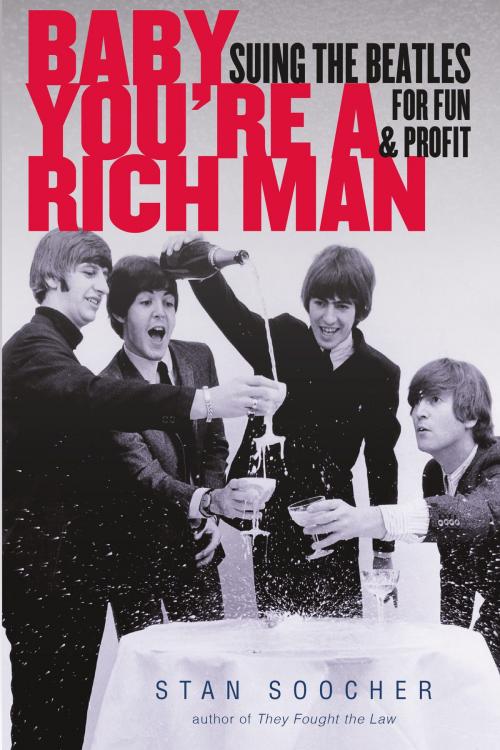Baby You're a Rich Man
Suing the Beatles for Fun and Profit
Nonfiction, Entertainment, Music, Pop & Rock, Rock, Music Styles| Author: | Stan Soocher | ISBN: | 9781611688139 |
| Publisher: | University Press of New England | Publication: | August 31, 2015 |
| Imprint: | ForeEdge | Language: | English |
| Author: | Stan Soocher |
| ISBN: | 9781611688139 |
| Publisher: | University Press of New England |
| Publication: | August 31, 2015 |
| Imprint: | ForeEdge |
| Language: | English |
The Beatles, the most popular, influential, and important band of all time, have been the subject of countless books of biography, photography, analysis, history, and conjecture. But this long and winding road has produced nothing like Baby You’re a Rich Man, the first book devoted to the cascade of legal actions engulfing the band, from the earliest days of the loveable mop-heads to their present prickly twilight of cultural sainthood. Part Beatles history, part legal thriller, Baby You’re a Rich Man begins in the era when manager Brian Epstein opened the Pandora’s box of rock ’n’ roll merchandising, making a hash of the band’s licensing and inviting multiple lawsuits in the United States and the United Kingdom. The band’s long breakup period, from 1969 to 1971, provides a backdrop to the Machiavellian grasping of new manager Allen Klein, who unleashed a blizzard of suits and legal motions to take control of the band, their music, and Apple Records. Unsavory mob associate Morris Levy first sued John Lennon for copyright infringement over “Come Together,” then sued him again for not making a record for him. Phil Spector, hired to record a Lennon solo album, walked off with the master tapes and held them for a king’s ransom. And from 1972 to 1975, Lennon was the target of a deportation campaign personally spearheaded by key aides of President Nixon (caught on tape with a drug-addled Elvis Presley) that wound endlessly through the courts. In Baby You’re a Rich Man, Stan Soocher ties the Beatles’ ongoing legal troubles to some of their most enduring songs. What emerges is a stirring portrait of immense creative talent thriving under the pressures of ill will, harassment, and greed. Praise for They Fought the Law: Rock Music Goes to Court “Stan Soocher not only ably translates the legalese but makes both the plaintiffs and defendants engrossingly human. Mandatory reading for every artist who tends to skip his contract’s fine print.”—Entertainment Weekly
The Beatles, the most popular, influential, and important band of all time, have been the subject of countless books of biography, photography, analysis, history, and conjecture. But this long and winding road has produced nothing like Baby You’re a Rich Man, the first book devoted to the cascade of legal actions engulfing the band, from the earliest days of the loveable mop-heads to their present prickly twilight of cultural sainthood. Part Beatles history, part legal thriller, Baby You’re a Rich Man begins in the era when manager Brian Epstein opened the Pandora’s box of rock ’n’ roll merchandising, making a hash of the band’s licensing and inviting multiple lawsuits in the United States and the United Kingdom. The band’s long breakup period, from 1969 to 1971, provides a backdrop to the Machiavellian grasping of new manager Allen Klein, who unleashed a blizzard of suits and legal motions to take control of the band, their music, and Apple Records. Unsavory mob associate Morris Levy first sued John Lennon for copyright infringement over “Come Together,” then sued him again for not making a record for him. Phil Spector, hired to record a Lennon solo album, walked off with the master tapes and held them for a king’s ransom. And from 1972 to 1975, Lennon was the target of a deportation campaign personally spearheaded by key aides of President Nixon (caught on tape with a drug-addled Elvis Presley) that wound endlessly through the courts. In Baby You’re a Rich Man, Stan Soocher ties the Beatles’ ongoing legal troubles to some of their most enduring songs. What emerges is a stirring portrait of immense creative talent thriving under the pressures of ill will, harassment, and greed. Praise for They Fought the Law: Rock Music Goes to Court “Stan Soocher not only ably translates the legalese but makes both the plaintiffs and defendants engrossingly human. Mandatory reading for every artist who tends to skip his contract’s fine print.”—Entertainment Weekly















